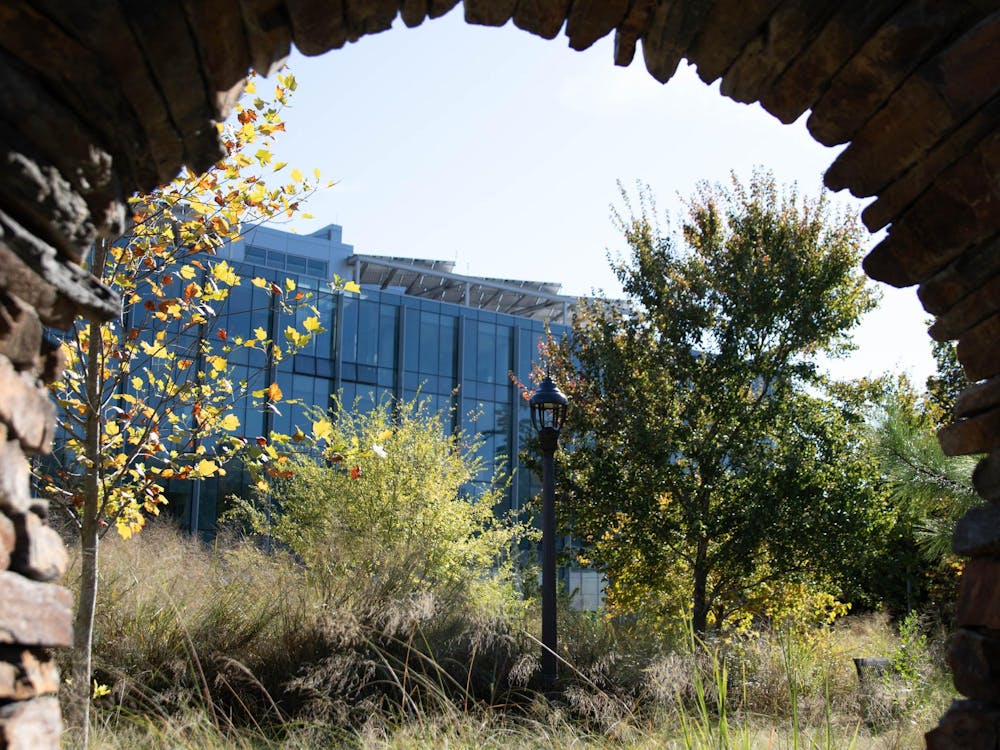The Office of Climate and Sustainability hosted the second installment of its nine-part seminar series focusing on questions of fiduciary duty related to climate risks and opportunities.
The first installment was held in September and discussed the investment responsibilities of mission-based institutions.
Community stakeholders, including undergraduate and graduate students, faculty from across the University’s schools and staff members, gathered for the Tuesday event. Graduate student Meera Ayyagari, director of environment and sustainability for the Graduate and Professional Student Government, and Sarah Raskin, Colin W. Brown distinguished professor of the practice of law, moderated the evening’s discussion.
They were joined by expert panelists Michelle Kallen and Tanja Vujic. Kallen served as the seventh solicitor general of Virginia before becoming a partner at Jenner & Block, and Vujic is the principal of Novi Strategies, a climate and energy strategy consulting firm she launched this month.
The discussion centered on Duke’s divestment from fossil fuels, which has been a hot-button issue among Duke students.
Raskin noted that fiduciary responsibility consists of two primary components: duty of care and duty of loyalty. She described duty of care as taking into account “all available information” that may be relevant in making decisions for a corporation, and duty of loyalty as “putting the entity’s interests first.”
Kallen, Raskin and Vujic weighed in on whether fiduciaries have a duty to consider sustainability, climate risks and climate opportunities when making investment decisions. All agreed that the responsibility exists in order to protect investments from physical or financial risks due to climate impacts.
“When you think about climate and you think about a fiduciary responsibility to be a shepherd of somebody’s assets and investments, to me that means that entity should be looking at everything that could possibly be putting that investment at risk,” Vujic said.
But Kallen also pointed out that using climate as an explicit criterion for investment decisions has become a point of controversy in the financial world, with some arguing that it is a breach of fiduciary duty and others claiming it is a necessary component. She noted that this unresolved debate makes it “very difficult to actually comply with in the marketplace.”
The moderators then turned to Duke’s investment practices, which are managed by the Duke University Managing Company.
In May 2020, the Board of Trustees released a “Guideline on Investment Responsibility” detailing the DUMAC’s objectives with the Duke endowment’s investments. The same day, the Board of Trustees released a “Statement on Climate Change and Investment” that links responsible investment practices for the University to “issues of integrity, quality, environmental impact, ethics and governments.”
“There’s a lot of wiggle room here,” Vujic said of the statements.
Audience members expressed concern that the only apparent action step outlined in either statement is the provision of “periodic reports” from DUMAC to the Executive Committee of the Board of Trustees, which would allow the monitoring of the “exercise of sound environmental stewardship.” Such reports are not available to the public, and it is unclear how frequently they are conducted or what they are used for.
The next session of the seminar series will take place on Nov. 14, and is set to focus on defining climate risk and determining how such risks should be considered in decisions around investment.
The Advisory Committee on Investment Responsibility, the official body through which community members can raise questions and concerns about DUMAC’s investment practices, is holding an open forum on Wednesday at 3 p.m. on Zoom.
Get The Chronicle straight to your inbox
Sign up for our weekly newsletter. Cancel at any time.

Zoe Kolenovsky is a Trinity junior and news editor of The Chronicle's 120th volume.

